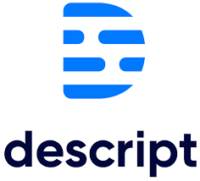Last week, while I was camping among the sand dunes of eastern Michigan (yes, we have sand dunes), the podcast world was in a lather about a cool new audio editing tool that was announced: Descript Podcast Studio. Watch the promotional video and you’ll understand why:
Over the years, audio editing tools have made the job increasingly easier. Some of us have been around long enough to have spliced tape back in the day. I created my first radio sweepers on an Orban digital work station. Over the years, ProTools and Adobe Audition changed the game for production directors. But when they were first introduced, these tools were largely used by professionals, not amateurs or hobbyists.
 Many of the podcasters I know started with free software like Audacity or Garageband before making the leap to Reaper, Hindenburg, or Adobe Audition. The feature that leads podcasters from one class of tools to the next is often Non-Destructive Editing — the ability to apply or remove effects like noise reduction or equalization to a track without having to worry about it adversely affecting your splices.
Many of the podcasters I know started with free software like Audacity or Garageband before making the leap to Reaper, Hindenburg, or Adobe Audition. The feature that leads podcasters from one class of tools to the next is often Non-Destructive Editing — the ability to apply or remove effects like noise reduction or equalization to a track without having to worry about it adversely affecting your splices.
While many of us consider non-destructive editing to be an essential feature, beyond that, the choice of audio editor is largely a matter of preference. Personally, I use Reaper because I like the way it integrates with my ShuttlePRO v2 scrub wheel, and after years in air studios cutting up phone calls on a VoxPro, I love me a good scrub wheel.
Has Descript now introduced the latest game-changing feature set for audio editors? Maybe. The power lies in its ability to allow you to edit using text. Not only can you remove audio by deleting words in the transcript, but the new Overdub feature allows you to add audio by inserting text. That’s an impressive feature — albeit a little scary at a moment when there’s a political crisis revolving around an audio transcript. (The company assures us that there are measures in place to ensure that people can only overdub their own voice.)
It’s fascinating that Descipt is marketing this software not just to audio professionals, but to everyday podcasters as well. The inexpensive monthly subscription model puts the price within reach of just about any hobbyist. What effect, if any, this will have on audio editing professionals remains to be seen. Will we see an influx of audio editors offering their services at low costs? Will this become an essential set of features for even the most skilled audio editors? Will this make audio editing accessible and exciting to a new generation of creators?
What do you think, production folks?
- A Simple Digital Treat to Thank Your Radio Listeners This Thanksgiving - November 13, 2023
- Interview Questions When Hiring Your Radio Station’s Next Digital Marketing Manager - November 6, 2023
- A Radio Conversation with ChatGPT: Part 2 – Promotions - October 30, 2023





Fascinating first dip into the pool with this software…
I really must try it myself to see where the advantages and limitations are; for example, EQ and dynamics control (to rein in the sound of cheezeball mics), the degree of “intelligent” editing so the end mix doesn’t contain half-breaths, VST and/or AU compatibility et al…
Those are my immediate off-the-cuff concerns, but for certain I will try it and give it a fair shake. FWIW, I don’t see it as a seismic shift or a threat to pro audio editors — its just one more tool in the kit. And Audacity is still free as the air.
Thanks, Alan. I haven’t gotten a chance to try it yet, but I’m very curious to do so. If you do get a chance to play with it, I’d love to know what you think!
I gotta say I love it. I might use it. I also do audio book narration so that would help me there too. Anything that is a time saver is a blessing.
I have been loyal to the many DAW over the years but its the ones that save me time and help get my work done faster and with as much quality that I love. This one might be it. Hopefully compatible with both mac and PC.. DOH!
Thanks, Jack! If you do test it out, I’d love to know what you think!
This looks brilliant. We use ProTools (sadly gave up Audition), and ProTools, for what we do in radio production, is like weeding your garden with a nuclear bomb.
I’d love to try this out!
I’ve never weeded my garden with a nuclear bomb, though a few times it’s needed it. Thanks, Joan!